Vanesaorasanin
Op deze pagina vind je alle documenten, voordeelbundels en oefenvragen die worden aangeboden door verkoper Vanesaorasanin.
- 7
- 0
- 0
Community
- Volgers
- Volgend
8 items
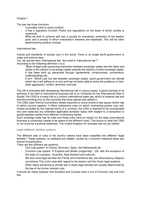
Business Organisation & Law, chapter 1
The law has three functions: - It provides rules to solve conflicts - It has a regulatory function. Rules and regulations on the basis of which society is organized. - What we wish to achieve with law: a society for everybody, protection of the weaker party and a society in which everybody’s interests are respected. This will be often determined by political choices International law Values and standards of society vary in the world. There is no single world government to make and enfor...
- Voordeelbundel
- Samenvatting
- • 3 pagina's •
The law has three functions: - It provides rules to solve conflicts - It has a regulatory function. Rules and regulations on the basis of which society is organized. - What we wish to achieve with law: a society for everybody, protection of the weaker party and a society in which everybody’s interests are respected. This will be often determined by political choices International law Values and standards of society vary in the world. There is no single world government to make and enfor...
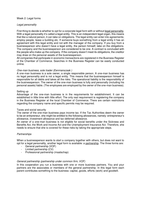
Business Organisation & Law, chapter 2
Legal personality First thing to decide is whether to opt for a corporate legal form with or without legal personality. With a legal personality it’s called a legal entity. This is an independent legal organ, this means that like a natural person, it can take on obligations. The legal entity can enter into agreements; employ people, lease a building etc. If someone buys something from a legal entity it has an agreement with this legal entity and not with the manager of the company. If you buy ...
- Voordeelbundel
- Samenvatting
- • 5 pagina's •
Legal personality First thing to decide is whether to opt for a corporate legal form with or without legal personality. With a legal personality it’s called a legal entity. This is an independent legal organ, this means that like a natural person, it can take on obligations. The legal entity can enter into agreements; employ people, lease a building etc. If someone buys something from a legal entity it has an agreement with this legal entity and not with the manager of the company. If you buy ...
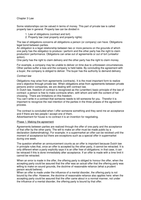
Business Organisation & Law, chapter 3
Some relationships can be valued in terms of money. This part of private law is called property law in general. Property law can be divided in 1. Law of obligations (contract and tort) 2. Property law (real property and property rights) The law of obligations concerns all obligations a person (or company) can have. Obligations legal bond between parties. An obligation is a legal relationship between two or more persons on the grounds of which one party has the obligation to produce / perform an...
- Voordeelbundel
- Samenvatting
- • 3 pagina's •
Some relationships can be valued in terms of money. This part of private law is called property law in general. Property law can be divided in 1. Law of obligations (contract and tort) 2. Property law (real property and property rights) The law of obligations concerns all obligations a person (or company) can have. Obligations legal bond between parties. An obligation is a legal relationship between two or more persons on the grounds of which one party has the obligation to produce / perform an...
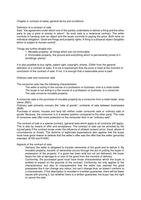
Business Organisation & Law, chapter 4
Definition of a contract of sale Sale: “the agreement under which one of the parties undertakes to deliver a thing and the other party to pay a price in money in return”. As such sale is a reciprocal contract. The seller commits to handing over an object and the buyer commits to paying the price. Both have an individual obligation. Good are things and property rights. A thing is a physical object (tangible) which is subject to human control”. Things are further divided into: 1. Movable p...
- Voordeelbundel
- Samenvatting
- • 4 pagina's •
Definition of a contract of sale Sale: “the agreement under which one of the parties undertakes to deliver a thing and the other party to pay a price in money in return”. As such sale is a reciprocal contract. The seller commits to handing over an object and the buyer commits to paying the price. Both have an individual obligation. Good are things and property rights. A thing is a physical object (tangible) which is subject to human control”. Things are further divided into: 1. Movable p...
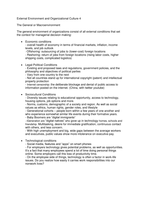
Introduction to management, Chapter 4
The general environment of organizations consist of all external conditions that set the context for managerial decision making: • Economic conditions - overall health of economy in terms of financial markets, inflation, income levels, and job outlook - Offshoring: outsourcing of jobs to (lower-cost) foreign locations - Reshoring: return of jobs from foreign locations (rising labor costs, higher shipping costs, complicated logistics) • Legal-Political Conditions - Existing and propos...
- Voordeelbundel
- Samenvatting
- • 4 pagina's •
The general environment of organizations consist of all external conditions that set the context for managerial decision making: • Economic conditions - overall health of economy in terms of financial markets, inflation, income levels, and job outlook - Offshoring: outsourcing of jobs to (lower-cost) foreign locations - Reshoring: return of jobs from foreign locations (rising labor costs, higher shipping costs, complicated logistics) • Legal-Political Conditions - Existing and propos...
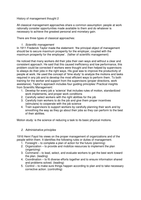
Introduction to management, Chapter 2
All classical management approaches share a common assumption: people at work rationally consider opportunities made available to them and do whatever is necessary to achieve the greatest personal and monetary gain. There are three types of classical approaches: 1. Scientific management 2. Administrative principles 3. Bureaucratic Organization Mayo and his colleagues concluded that new ‘social setting’ led workers to want to do a good job. (special attention and social interactions made...
- Voordeelbundel
- Samenvatting
- • 6 pagina's •
All classical management approaches share a common assumption: people at work rationally consider opportunities made available to them and do whatever is necessary to achieve the greatest personal and monetary gain. There are three types of classical approaches: 1. Scientific management 2. Administrative principles 3. Bureaucratic Organization Mayo and his colleagues concluded that new ‘social setting’ led workers to want to do a good job. (special attention and social interactions made...
